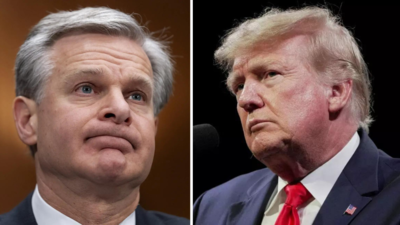
FBI Director Christopher Wray‘s resignation, announced just as Donald Trump prepares to take office again, is the culmination of a tumultuous relationship marked by intense political pressure and public feuding. Wray’s tenure, which began under Trump’s administration in 2017, has been characterized by a series of conflicts that ultimately led to his decision to step down at the end of Biden’s term.
The backdrop to Wray’s resignation is a series of events that have strained his relationship with Trump. Trump’s dissatisfaction with Wray reportedly culminated in his recent nomination of Kash Patela staunch Trump ally, as Wray’s successor.
Key events leading up to Wray’s resignation include:
June 2017: Trump nominates Wray after firing James Comey amid investigations into Russian interference in the 2016 election.
August 2022: The FBI conducts a search of Trump’s Mar-a-Lago estate for classified documents, intensifying Trump’s criticism of Wray and the agency.
November 2024: Trump wins re-election and announces Patel as his choice for FBI director.
December 11, 2024: Wray announces his resignation, clearing the way for Patel to take over 789.
In response to Wray’s resignation, Trump celebrated on social media, calling it “a great day for America” and claiming it would end what he termed the “Weaponization” of the Justice Department. Meanwhile, Attorney General Merrick Garland praised Wray for his honorable service during a challenging period.
The beginning of a contentious relationship
Wray was appointed by Trump following the controversial firing of FBI Director James Comey, who had been overseeing investigations into Russian interference in the 2016 election. Initially praised by Trump as a “model of integrity,” Wray’s position quickly became precarious as investigations into Trump’s conduct began to unfold. In December 2017, Wray defended the FBI against Trump’s accusations that the agency was biased and had a tarnished reputation, saying, “The FBI I see are tens of thousands of men and women who are hard-charging people of integrity”.
Escalating tensions
As Trump’s presidency progressed, tensions escalated significantly. The FBI’s investigation into Russian interference and subsequent inquiries into Trump’s actions during and after the 2020 election led to increasing criticism from the former president, as reported by US Today. In August 2022, the FBI’s search of Trump’s Mar-a-Lago estate for classified documents provoked a furious backlash from Trump, who labeled it an example of “weaponization” against him. He claimed that Wray had presided over an agency that was part of a “Deep State” conspiracy aimed at undermining his presidency.
By late 2024, as Trump prepared for a return to the White House following his electoral victory, he had already nominated Kash Patel—a staunch ally and vocal critic of Wray—as his successor. This nomination signaled Trump’s intent to replace Wray upon taking office, further intensifying the pressure on the FBI director, as reported by US Today.
The final decision
Wray’s announcement on December 11, 2024, that he would resign at the end of Biden’s term was framed as a strategic move to keep the FBI focused on its mission without becoming embroiled in political controversies. “After weeks of thoughtful consideration,” Wray said, “I believe the best course for the Bureau is for me to fulfill my duties until the end of the administration… while avoiding dragging the Bureau deeper into the fray”.
Trump responded swiftly to Wray’s resignation, declaring it “a great day for America,” asserting that it would help end what he described as the “Weaponization” of the Justice Department 25. This culmination of years-long tensions reflects not only personal animosity but also broader political dynamics that have increasingly politicized law enforcement agencies in America.



















